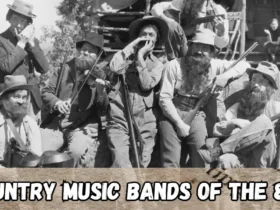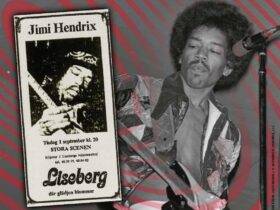Few arts elicit emotion as vividly as music. It also stirs memories and societal shifts, spanning an enormous range of human expression. Myths have smoothly woven themselves into the very fabric of the industry inside the lovely tapestry of songs. Join us on a melodious adventure as we will peel back the layers of myth and music, uncovering forgotten stories that echo through the sound corridors.
Freddie Mercury, the Glory of Queen and Music History
Freddie Mercury, the charismatic frontman of the iconic band Queen, left an indelible influence on the music business. He did so with his unrivaled musicianship, showmanship, and compelling stage presence. His charm was a force that transcended traditional rock. It established him as a legendary figure in the global music industry.
Mercury’s appeal was complex. It stemmed from his incredible singing ability, flamboyant theatrical demeanor, and genuine connection with his audience. His vocal range was incredible, spanning four octaves. It allowed him to transition seamlessly between operatic highs and rock-infused lows. His verbal skill and natural musicianship distinguished him as a true professional virtuoso.
Freddie Mercury was a charismatic performer with an extraordinary ability to command attention on stage. His energy and infectious enthusiasm for his profession generated an electrifying atmosphere. The atmosphere echoed throughout stadiums and performance halls. Mercury’s charm was a magnetic force. It drew people into the Queen experience. Whether walking around the stage or playing to the crowd with a signature raised fist.
Mercury’s magnetism was evident in his songwriting and vocal and physical presence. His ability to create songs that spoke to people personally and universally demonstrated a deep knowledge of music’s emotional power. Mercury’s compositional prowess is evident in songs like “Bohemian Rhapsody.” It has operatic grandeur. “We Are the Champions” is an iconic homage to triumph and resilience.
Furthermore, Mercury’s appeal was evident in his boldness in challenging norms. He became a forerunner for LGBTQ+ representation in the music industry as a flamboyant and openly gay artist when such visibility was uncommon. His sincerity, refusal to conform, and unashamed expression of his uniqueness contributed to his status as a cultural icon. He also became a symbol of self-empowerment.
Mercury’s personality shone through in interviews and contacts with the media and on stage. His wit, charm, and larger-than-life demeanor won him fans and demonstrated that he was a man who lived on his terms.
Freddie Mercury’s charm, in essence, was the alchemy that converted Queen from a terrific band into a cultural phenomenon. His legacy inspires new generations of performers. His influence on the music industry proves the enduring power of charisma in art.
Myths and Queen
Queen and Freddie Mercury are two names linked with the golden era of rock & roll. Yet, among the echoes of their triumph, some myths have persisted like tenacious riffs. Join me as we go myth-busting, stripping back the layers of lore surrounding this iconic band and its captivating frontman.
Myth #1: Freddie Mercury’s Real Name Isn’t Freddie Mercury
In the rock and roll world, rumors about Freddie Mercury’s real name are circulating, which remains a cryptic mystery yet to be solved. Farrokh Bulsara, the man behind the vocal magic, was born amid the vivid terrain of Zanzibar in 1946. “Freddie Mercury” wasn’t a cosmic epiphany. It was a stage moniker. He meticulously constructed it to reflect the performer’s vitality and flare.
Myth #2: Queen Only Touched the Surface of Musical Genres
Imagine a universe where Queen’s musical journey is confined to just one genre. Fortunately, reality is far from it. Queen, a musical chameleon, hopped from genre to genre like a cosmic orchestra. The Queen’s reluctance to be boxed into any musical cliche is evident in their repertory. They go from the foot-stomping “We Will Rock You” to the epic saga of “Bohemian Rhapsody.”
Myth #3: Freddie Mercury Was a Classically Trained Opera Singer
The notion that Freddie Mercury received intense opera virtuoso instruction is as outlandish as the genres Queen conquered. Freddie’s vocal acrobatics resulted from an innate gift and an unrestrained passion for music. They did not come from professional training. He could sing beyond octaves without opera tradition’s restraints. This adds to his reputation as a natural-born vocal genius.
Myth #4: Queen’s Success Was Instantaneous
Consider this: Queen sprang to fame overnight, basking in instant success. However, the Queen paved their rise to fame with the harsh grind of small venues and their dedication to polish their craft. It wasn’t until their fourth album, “A Night at the Opera,” that the world finally recognized Queen’s greatness.
Myth #5: “Bohemian Rhapsody” Is an Unsolvable Enigma
“Is this real life?” Is this all a dream?” The “Bohemian Rhapsody” legend implies that it is an impenetrable mystery, a musical Da Vinci Code. In reality, the song synthesizes Freddie’s actual experiences and an abstract narrative. It offers a glimpse into the mind of a musical genius rather than an enigma.
Myth #6: Freddie Mercury’s Stage Persona Hid a Shy Individual
On stage, Freddie Mercury was a force of nature: flamboyant, charismatic, and larger than life. The misconception that his on-stage presence concealed a shy and reserved personality off-stage is only partially true. Freddie was a private person. His flamboyance was an extension of his artistic expression. It was a method for him to channel the energy within him.
Myth #7: Queen’s Magic Vanished with Freddie Mercury’s Passing
The misconception that Queen’s magic vanished with Freddie Mercury’s tragic death does the band a disservice. Yes, Freddie’s disappearance created an insurmountable vacuum. Still, Queen soldiered on, releasing music with many vocalists. The band’s collective soul contains the magic rather than a single member.
Myth #8: “Another One Bites the Dust” Has Sinister Undertones
The bassline that enters your soul – “Another One Bites the Dust.” Contrary to popular belief, the song originated in a groovy experiment. Queen was known for pushing limits. They developed a bassline that became an anthem, proving that every appealing melody does not have to have a wrong side.
Myth #9: Freddie Mercury Was a Perfectionist in the Studio
Freddie Mercury, a studio perfectionist? Not completely. The myth ignores Freddie’s love of spontaneity and the organic progression of a song during recording. Yes, he had a strong musical ear. Still, he matched precision with the freedom to let creativity flow, resulting in some of Queen’s immortal classics.
Myth #10: Queen Only Touched the Hearts of Rock Fans
The universality of Queen’s successes dispels the misconception that their music is exclusive to rock enthusiasts. “We Are the Champions” and “Radio Ga Ga” aren’t limited to a single genre. They appeal to a wide range of people and generations, shattering the image of a small fan base.
FAQs
Q1: Was Freddie Mercury really born with the name Freddie Mercury?
No, Freddie Mercury was born Farrokh Bulsara. Freddie Mercury chose the stage name “Freddie Mercury” to convey his dynamic and flamboyant personality. He wanted to be an iconic performer.
Q2: Did Queen stick to a specific musical genre?
Certainly not. Queen’s musical journey ranged from rock anthems like “We Will Rock You” to the operatic masterwork “Bohemian Rhapsody.” They refused to restrict themselves to a single musical style.
Q3: Was Freddie Mercury a classically trained opera singer?
No, Freddie Mercury did not have any opera training. He had an exceptional vocal range and acrobatic abilities. He was naturally skilled and had a true interest in many kinds of music. This showed that natural talent often beats traditional training.
Q4: Did Queen achieve instant success?
No, the Queen’s triumph did not come overnight. The band overcame the hurdles of tiny venues and developing their art. They broke through with their fourth album, “A Night at the Opera.””
Q5: What is the meaning behind “Bohemian Rhapsody”?
“Bohemian Rhapsody” combines Freddie Mercury’s personal experiences with abstract storytelling. It’s more of a glimpse into the mind of a musical genius than an insoluble mystery.
Q6: Was Freddie Mercury a shy individual off-stage?
Although Freddie Mercury was reserved off-stage, the stereotype of him being bashful ultimately does not reflect his nature. His flamboyance on stage was a natural outgrowth of his creative expression.
Q7: Did Queen lose its magic after Freddie Mercury’s passing?
No, Queen’s magic lasted long after Freddie Mercury died. His absence left an irreplaceable vacuum. The band continued to create songs with various vocalists, demonstrating the tenacity of the Queen spirit.
Q8: Does “Another One Bites the Dust” have sinister undertones?
Contrary to popular belief, “Another One Bites the Dust” is a groovy rhythm experiment rather than a scary undertone. It demonstrates the Queen’s diversity and willingness to experiment musically.
Q9: Was Freddie Mercury a perfectionist in the studio?
While Freddie Mercury had an excellent musical ear, he could have been a studio perfectionist. He valued spontaneity and the organic evolution of a song during recording. He found a happy medium between precision and creative flexibility.
Q10: Is Queen’s music exclusive to rock fans?
No, Queen’s music crosses genres and appeals to many audiences. Hits like “We Are the Champions” and “Radio Ga Ga” demonstrate Queen’s global appeal beyond rock fans.
Conclusion
Finally, the myths surrounding Queen and Freddie Mercury are like transitory smoke. They dissolve in the face of enduring reality. Let us celebrate the truth. It is a saga of tenacity, ingenuity, and musical innovation. It cemented Queen and Freddie Mercury’s place in music history.
As we go through the enchanted realms of myth and music, it becomes clear that these stories are not trivial distortions. Instead, they are essential components of the story. We create a space where artists can grow by deconstructing myths and embracing music’s ever-changing nature. Genres may coexist, and the musical landscape resonates with authenticity. The music industry thrives through the interplay of fact and myth. It produces a harmonious future for tomorrow’s musical explorers. It’s like an unending symphony.













Leave a Reply